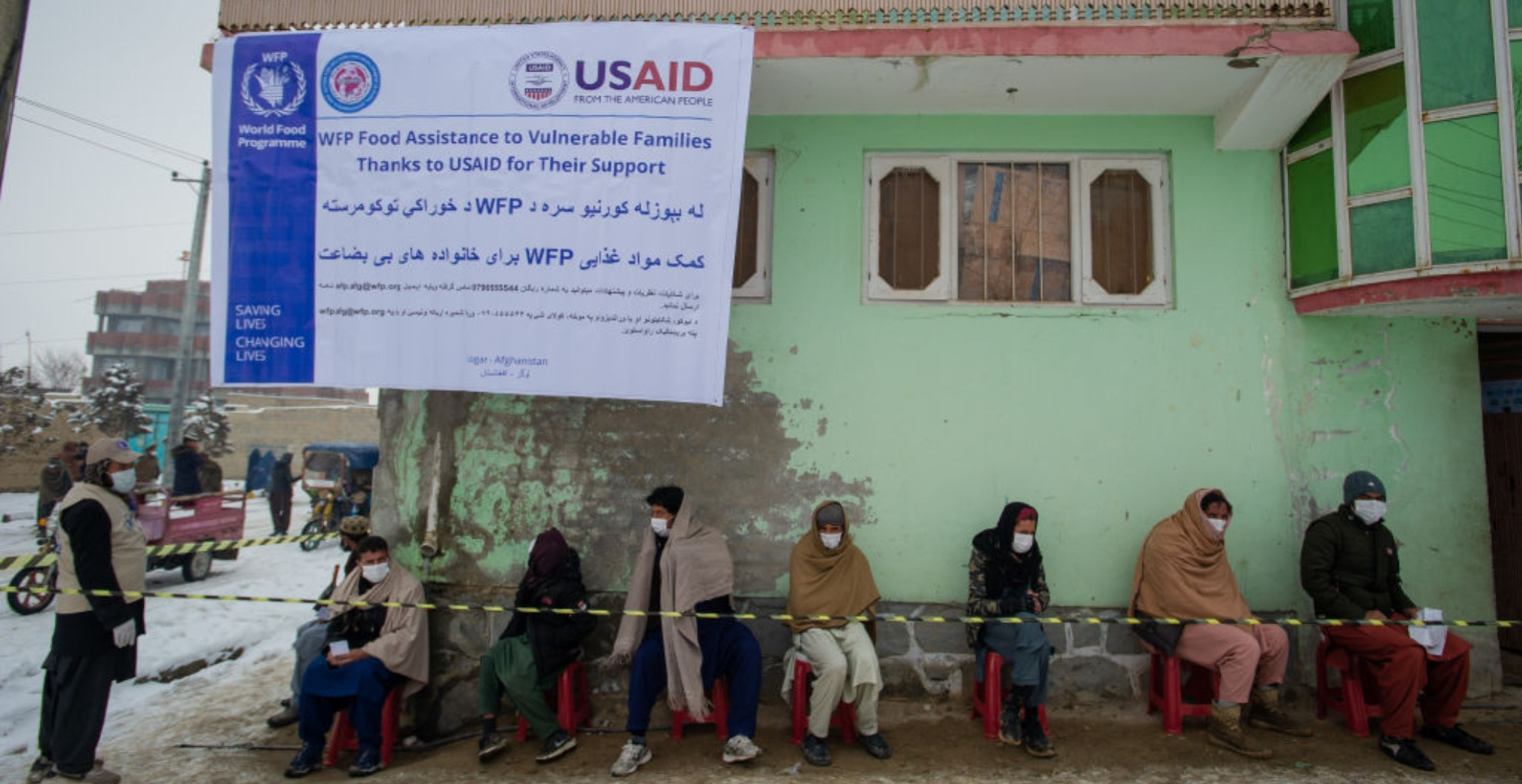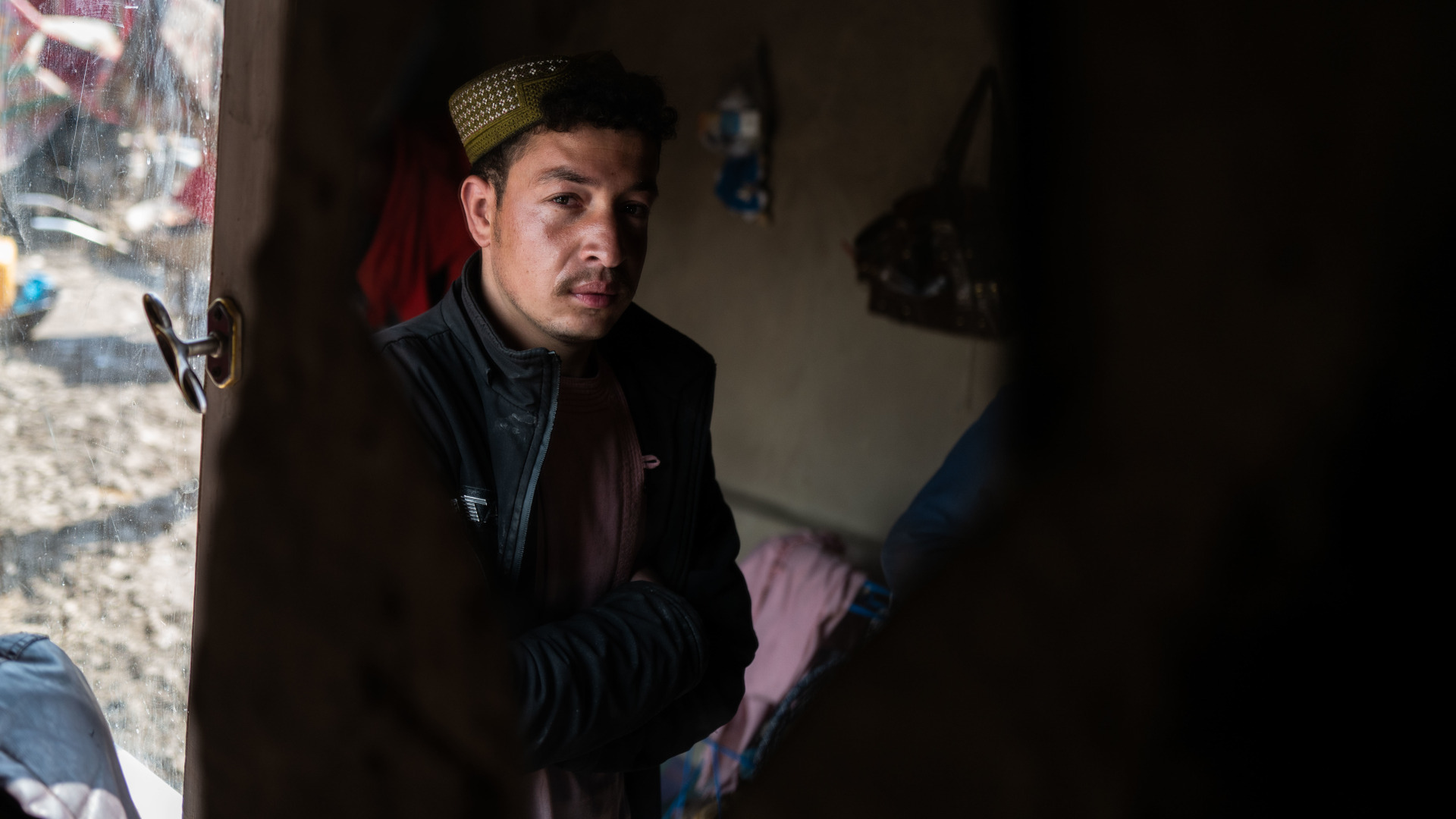The House of Representatives recently passed the $839 billion National Defense Authorization Act to fund the U.S. military into 2023. Among hundreds of items, including establishing a “Space National Guard” and piloting a research and development program for plant-based protein, the bill prohibits the Pentagon from transporting “currency or other items of value” to Afghanistan. The measure aims to weaken the Taliban, but as The Intercept reported, it also restricts the transport of food, medical supplies, and other lifesaving essentials to the Afghan people.
With 95 percent of Afghans not having enough to eat, and an estimated 97 percent already plunged into poverty, the bill would leave Afghanistan at risk of an even greater public health catastrophe. While the U.S. has imposed wide-ranging sanctions against the Taliban since 2001, the Treasury Department implemented two general licenses in September 2021 to facilitate the continued flow of humanitarian aid to Afghanistan. Given that the U.S. is the single largest donor of humanitarian aid to the country by far, the NDAA’s broad restrictions would be an especially critical blow to the Afghan people.
This is not the first time the U.S. has leveraged aid as a blunt political weapon in Afghanistan. Next week will mark the one-year anniversary of the U.S. withdrawal from Afghanistan — a 20-year occupation that saw the U.S. military co-opt humanitarian assistance as a counterinsurgency strategy to undermine support for the Taliban. That strategy, however, incentivized poorly implemented, unsustainable projects and fueled corruption.
As one example, the U.S. Agency for International Development invested $18.5 million into building two hospitals in eastern Afghanistan in 2008 — but shared these plans with the Afghan Ministry of Public Health only a year after they started building. Beyond these hospitals being marred by poor construction and delayed completion, they cost about five to six times more to operate and maintain than existing hospitals in the region. An audit by the Special Inspector General for Afghanistan Reconstruction on one of the hospitals reported, “it is unclear what steps USAID took to determine whether the ministry had the ability to operate this facility.” The fingerprints of similar U.S. mismanagement, over decades, have contributed to the current crisis.
Empirically speaking, there is little evidence to suggest that the continued denial of humanitarian aid will force the Taliban to change course from their repressive policies. In fact, the opposite may be true. The Taliban remain largely indifferent to the suffering of millions of Afghans and the numerous health crises in their country. The current version of the NDAA may make American lawmakers look tough, but societal collapse only plays into the hands of the Taliban.
Given these conditions, we strongly urge the Senate to not pass — and the president to not sign — the bill without permitting the provision of medical and humanitarian aid to Afghanistan.
In November 2021, we wrote about the Afghan public health crisis for Nature Medicine, arguing that the international community had a moral and practical obligation to continue providing aid to the country. The alternative was to risk endangering access to basic medical care and reverse decades of infrastructural progress. The past year has confirmed the worst of our nightmares.
The Afghan health care system is actively collapsing, with outbreaks of infectious diseases including measles and acute watery diarrhea. Hospitals are overwhelmed and strapped for funds, unable to ensure electrical power, run their ambulances, or feed their patients. Many doctors have fled the country, while those who have stayed haven’t been paid in months. The country’s Covid-19 response has been crippled by a shortage of ventilators and medical oxygen, while only 10 percent of the Afghan population was vaccinated as of May, with millions of doses being left unused. These shortcomings could have an effect beyond Afghanistan’s borders, as new Covid-19 variants evolve amid low vaccination rates.
Perhaps the starkest example of this collapse is the Sehatmandi project, which used to be the backbone of Afghanistan’s health care system with more than 20,000 medical staff across 2,309 facilities before the Taliban took over last year. The World Bank paused the project’s funding in August 2021, leaving millions of vulnerable Afghans without essential care. Although the World Health Organization and UNICEF are trying to sustain Sehatmandi, the International Rescue Committee predicts that 90 percent of the country’s health clinics are now at risk of shutting down.
This is a devastating turn of events. In 2018, 87 percent of Afghanistan’s population had access to care within a two hours distance, with more than 3,000 functional health facilities across the country. Between 2007 and 2017, life expectancy had increased from 52 for women and 53 for men to 63 for all, while maternal mortality had been halved since the 1990s. Afghanistan, one of two remaining countries with endemic polio (along with Pakistan), was fiercely committed to eradicating the virus. The Taliban have offered nominal concessions, such as allowing polio campaign workers safe access in some areas, but these hard-fought gains continue to be eroded by the general indifference of both the Taliban and the international community.
By restricting aid in the name of being anti-Taliban, the U.S. is punishing a society already suffering under tyrannical rule. In June, a magnitude 5.9 earthquake hit Afghanistan, killing at least 1,000 people and injuring at least 1,500. Local hospitals were overwhelmed and unequipped to care for the survivors: One five-bed clinic in eastern Afghanistan, for instance, was flooded with 500 injured patients, of which 200 died later that day. The earthquake rescue response itself was characterized by its sluggishness and limited scope, at least partially attributable to sanctions. While the U.S. military provided humanitarian support, it would have been barred from doing so under the House NDAA. As existing aid to Afghanistan dries up because of inflation and the global focus on Ukraine, the U.S. can do much more.
Although the House Rules Committee rejected a “humanitarian waiver” amendment proposed by Rep. Ilhan Omar, the Senate could incorporate one into their version of the NDAA, which is expected to be voted on after the August recess, and ensure that it remains in place through the reconciliation process. Given an unprecedented famine, drought, and economic crisis, a blanket ban on aid to Afghanistan is cruel and capricious. A waiver that would allow — but not require — the president to provide humanitarian aid, as is in place for North Korea and Iran, is the least we can do.
Perhaps more importantly, the Treasury Department still sits on $7 billion in Afghan Bank reserves that it seized after the Taliban takeover. Nearly a year later, this move has not made the Taliban change policies and instead has drained the Afghan economy of liquidity, underpinning the hunger crisis and health care collapse. The U.S. and Taliban have been discussing ways to potentially release some of these reserves, but given the recent drone strike on al-Qaeda leader Ayman al-Zawahiri in Kabul, talks have collapsed, leaving the Afghan people in a deadly limbo.
None of this is to say that the U.S. should legitimize the Taliban or stop pushing them to form an inclusive government, protect women’s rights, and renounce terrorism. But a policy of withholding life-saving funds cannot be the bargaining chip. Who are we really benefiting if, as the Center for Economic and Policy Research noted, U.S. sanctions “could be deadlier than 20 years of war”? Unvarnished cruelty may be the biggest weapon of mass destruction.
Despite our disdain for Taliban misrule, we must not blame the victims — the Afghan people — and condemn them to death and despair. They deserve our empathy and support, not our draconian indifference.
Simar Bajaj studies the history of science at Harvard University and is a research fellow at Stanford and Massachusetts General Hospital.
Bhav Jain is a 2022 Truman Scholar and a fellow in the Office of the Executive Director at the Boston Public Health Commission.
Mariam Noorulhuda is the child of political asylum refugees from Afghanistan and a bioethics fellow at the National Institutes of Health.
Robert D. Crews is a professor of history at Stanford University, and the editor-in-chief of the journal Afghanistan.
This article expresses the personal views of the authors above.












Comments are automatically closed one year after article publication. Archived comments are below.
So easy to blame the US for some of the ills of Afghanistan and the US is partiallyresponsible for some of the remaining chaos of a failed nation-building effort, but the US also added 10 years to the lifespan of Afghanis as noted. That being said, it is also noted in this article that the US is far and away the largest supplier of aid to Afghanistan one year after withdrawing from a functionally-failing nation. My question is why aren’t other regional players doing more than the US to assist Afghanis? Where are the Pakistanis, the Iranians, the Turkmen, the Tajiks, and the Uzbeks? How about the western Gulf states with all of their oil money? Don’t they have a stake in the outcome of Afghanistan? What have they done to earn a pass on your moralizing about aid to Afghanistan? The biggest long term challenge facing Afghanistan is the fact that there is still a lot of native support for the Taliban and their fundamentalist view of Islam. How does one address that? Maybe instead of lambasting the US for its approach in Afghanistan on this issue you could point your pen to the greater, over-arching issues stemming from their tribalism and religious perspectives which will continue to impact Afghanis once this current crisis has passed.
How did we address the fact that a post-war Germany was going to have a lot of folks that still supported the Nazis?
I think it’s valid to point out that other states are not participating, but I don’t vote in Qatar. We only have control (in theory) over what the U.S. does, and what the U.S. has done here is horrific.
I remember the pictures of the chemically-bombed Kurds who rebelled against Iraq after many became hopeful of U.S. support following the first Gulf War. This following so many instances of the U.S. moving into a region, giving the impression they would support the freedom lovers there, then punking out, starting with Vietnam. We actually pushed Ukraine to give up their nuclear weapons with the assurance we would make sure Russia didn’t use that as an opportunity to invade. This has become the American norm in the world, it’s turned me into an isolationist. I’m glad to see this story.